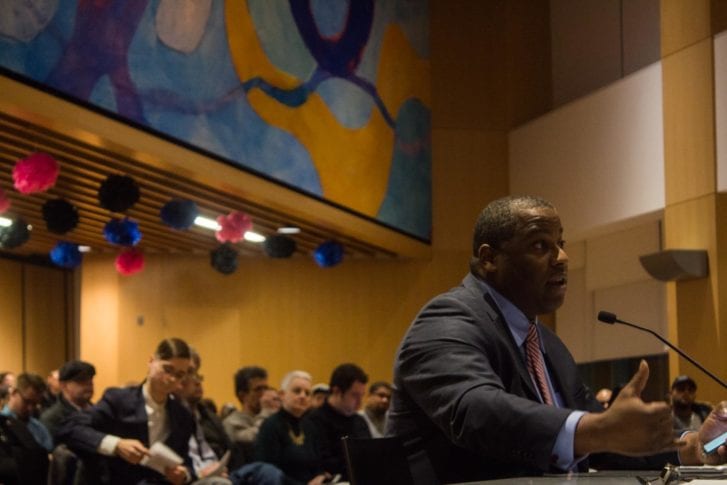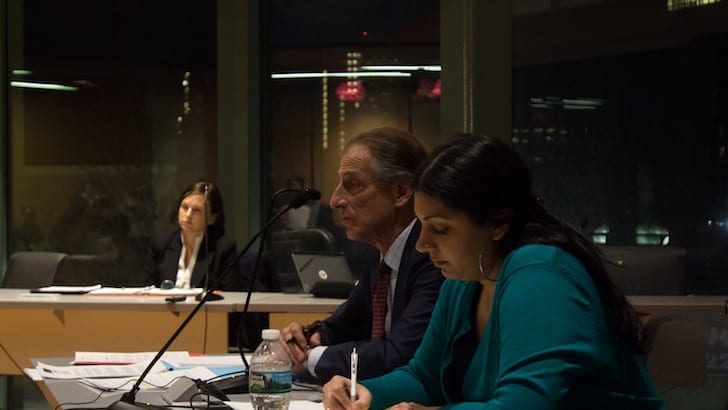
Seating ran low and the clock ran into overtime last week as nearly 200 people filled the Massachusetts Cannabis Control Commission’s (CCC) final public hearing on draft regulations for the budding Commonwealth industry.
For more than two and a half hours, community and marijuana advocates, attorneys, concerned citizens, and others addressed CCC Chairman Steven J. Hoffman and Commissioner Shaleen Title at the Bolling Municipal Building in Roxbury. Their comments touched on topics ranging from temporary event and delivery licenses to public consumption areas and opportunities that could be opened up by the recreational cannabis industry in Mass.
Starting off the evening, former Boston City Council member and recent mayoral candidate Tito Jackson called out the proposed restrictions on employment.
“We don’t want the people who were locked up in the first place to be locked out of opportunities in this space,” Jackson said. “I know that there are others who only want this to be limited to previous cannabis offenses. That is unacceptable. We need to provide economic opportunity and economic justice in this space, and we must do a better job there. So we need to include rather than exclude all of those who have prior drug offenses and give them economic opportunities.”
Jeremy Thompson, a board member of Thrive Communities, which supports adults who are returning home after being incarcerated, added to Jackson’s remarks, focusing on heavy links between violent crime and the criminalization of cannabis.
“At times when people were getting arrested in urban communities, drugs and guns were hand in hand,” Thompson said. “When we talk about cutting people out because of violence convictions or weapon charges or things like that, it’s effectively cutting them out of the industry. So when we talk about inclusion, we have to get to the details of why these people were in these situations. Once you do, I think on an individual basis we’ll be able to weed out the people who can participate in the program.”

There was also plenty of criticism of the CCC’s drafted restrictions on delivery services.
Jackson implored the commission to base its delivery guidelines on businesses that have already developed their own practices, rather than treating delivery as a public safety threat.
“[With regard to] this mentality about delivery being something that is scary, we already have delivery services in place currently,” Jackson said. “The question is, what are the best practices? What types of rules, regulations, and standard operating procedures are the best way to go relative to that? What we should be doing is asking the people who are currently in business doing that.”
Kamani Jefferson, president and registered lobbyist of the Massachusetts Recreational Consumer Council, addressed the importance of delivery licenses as well as social consumption event licenses, which would provide a low barrier to entry for those who wish to participate in the cannabis market by renting a location for a short period of time.
“Allowing the illicit market to continue without providing a way for those conducting [consumption] events to transition into the legal market puts them at risk for police enforcement. We should be creating pathways for experienced local residents instead of targeting them,” Jefferson said. “Not everyone can afford to own a storefront location in Mass.”
According to Jackson and a chorus of others, it’s not simply ideal to mindfully allow the participation of Black and Latinx residents, but that’s the only way to keep the industry from getting dominated by venture capital.
“The defining question is, are we going to use this as a new economy that is going to lift all or just some who are already lifted?” Jackson asked.
Matt Allen, field director of the ACLU of Massachusetts, offered the ACLU’s recommendations regarding the CCC’s equity provisions for new marijuana businesses.
“In the long term, the commission should absolutely promote full participation by all groups that have faced discrimination, individually or institutionally, including women, the LGBT community, and veterans,” Allen said. “In the short term, the focus should be on communities that bore the brunt of the drug war, and that should be determined geographically by looking at areas where there have been higher levels of arrests, but also by looking at race.”
Activist efforts continued into the morning of Feb 15, as the Marijuana Policy Project of Mass held a press conference on the State House steps, responding to statements on the draft regulations by Gov. Charlie Baker, as well as district attorneys from around the state and various lawmakers. The demonstration aimed to call out the Baker administration’s “coordinated campaign that threatens the independence of the CCC.”
Shanel Lindsay, chairman of the Massachusetts’ Cannabis Advisory Board’s Market Participation Subcommittee and a drafter of Question 4, was among those who accused Baker’s administration of attempting to stifle the CCC’s efforts in a way that would only benefit “big marijuana.”
“The commission listened, they deliberated, and they voted in favor of small business,” Lindsay said. “So why are we gathered here today, in a fight against maintaining a broken system that prefers only the wealthy and well-connected? It smacks of insider dealing at the expense of small business, and that we will not accept.”
Moving forward, the CCC is supposed to finalize its rules and regulations before July 1, when retail shops are slated open in the Commonwealth.

























